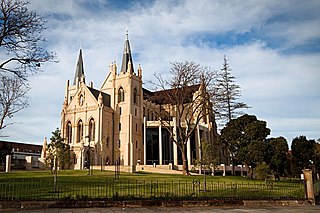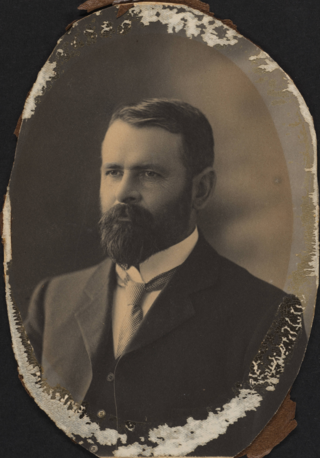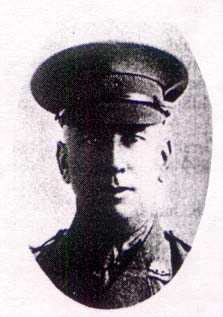
Barcaldine is a rural town and locality in the Barcaldine Region in Queensland, Australia. This is the administrative centre of the Barcaldine Region. Barcaldine played a major role in the Australian labour movement.

Mount Morgan is a rural town and locality in the Rockhampton Region, Queensland, Australia. The town was the administrative centre of the Mount Morgan Shire until March 2008, when it was amalgamated with neighbouring local government areas to form the Rockhampton Region.

Subiaco is an inner-western suburb of Perth, the capital of Western Australia. It is approximately 3 km (1.9 mi) west of Perth's central business district, in the City of Subiaco local government area. Historically a working-class suburb containing a mixture of industrial and commercial land uses, since the 1990s the area has been one of Australia's most celebrated urban redevelopment projects. It remains a predominantly low-rise, urban village neighbourhood centred around Subiaco train station and Rokeby Road.
Subiaco Oval was a sports stadium in Perth, Western Australia, located in the suburb of Subiaco. It was opened in 1908 and closed in 2017 after the completion of the new Perth Stadium in Burswood.
Dundas is a suburb of Sydney, New South Wales, Australia. Dundas is located 21 kilometres north-west of the Sydney central business district, in the local government area of the City of Parramatta, and the electoral division of Bennelong. Dundas is a leafy green suburb, notably due to its centrepiece The Ponds Walk, which follows the Ponds Subiaco Creek. Dundas is part of the Northern Sydney and Greater Western Sydney regions.
Wembley is a western suburb of Perth, Western Australia, located within the Town of Cambridge. Its postcode is 6014.

Daglish is a small western suburb of Perth, the capital of Western Australia. It is approximately 4 kilometres (2.5 mi) west of the Perth central business district, and within the City of Subiaco local government area. It was named after Henry Daglish, who was the mayor of Subiaco, member for the electoral district of Subiaco and premier of Western Australia from 1904 to 1905. The Daglish railway station opened in 1924 in response to population growth in the neighbouring suburb of Subiaco. The following year, the Municipality of Subiaco bought the land west of the railway station to sell for housing. Development occurred over the following 20 years. The initial development next to the railway station used the garden suburb principles, with large lots and gardens, curved streets, and lots of green space. Today, the suburb has significant heritage value due to its uniform streetscape, with most original homes still standing. It has a population of 1,419 as of the 2016 Australian census.

The City of Perth is a local government area and body, within the Perth metropolitan area, which is the capital of Western Australia. The local government is commonly known as Perth City Council. The City covers the Perth city centre and surrounding suburbs. The City covers an area of 20.01 square kilometres (8 sq mi) and had an estimated population of 21,092 as at 30 June 2015. On 1 July 2016 the City expanded, absorbing 1,247 residents from the City of Subiaco.

St Mary's Cathedral, Perth, officially the Cathedral of the Immaculate Conception of the Blessed Virgin Mary, is the cathedral church of the Roman Catholic Archdiocese of Perth, and seat of its Archbishop, currently Timothy Costelloe.

The City of Subiaco is a local government area in Western Australia. It covers an area of approximately 7 km² in inner western metropolitan Perth and lies about 3 km west of the Perth CBD. The City includes the historically working-class suburb of Subiaco centred around Rokeby Road. Since the 1990s the area has been extensively redeveloped and gentrified.

Louis Joseph Daily was an Australian rules footballer who played for Collingwood and Geelong in the Victorian Football League (VFL) as well as Subiaco in the West Australian National Football League (WANFL).

Perth Stadium, currently known as Optus Stadium due to sponsorship reasons, is a multi-purpose stadium in Perth, Western Australia, located in the suburb of Burswood. It was completed in late 2017 and officially opened on 21 January 2018. The stadium's total capacity is 61,266, including standing room, making it the third-largest stadium in Australia. The stadium can be extended up to 65,000 seats for rectangular sports.

Bundaberg Central is the central suburb and central business district of Bundaberg in the Bundaberg Region, Queensland, Australia. In the 2021 census, Bundaberg Central had a population of 162 people.

Michael Francis Cavanagh was an Australian architect, primarily known for his work in Western Australia from 1895 to the late 1930s.

St Denis Church is a Roman Catholic church in the Perth suburb of Joondanna, Western Australia.

Bartholomew James Stubbs was the first sitting member of the Western Australian Legislative Assembly to be killed in action while on military service for his country.

The Subiaco Hotel is a historic hotel in Subiaco, Western Australia. It is located at 455–465 Hay Street, at the corner of Rokeby Road, and dates back to the state's gold rushes era of the 1890s.
Joseph Duffell was an Australian politician who was a member of the Western Australian Legislative Council for the Metropolitan-Suburban Province from 22 May 1914 to 21 May 1926. He was a member of the Liberal Party up until 1917, when he became a member of the National Party.















